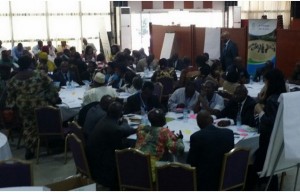FREE FLOW OF INFORMATION
An article by M. Franck Carel Nkaya, UNESCO
Addressing the new challenges of the Central African region, the UNESCO Regional Office for Central Africa [Yaoundé, Cameroon] organized for its partners from 20 to 22 April 2016, a meeting of exchange and participatory reflection on “Contributions of UNESCO and its partners to the efforts of ECCAS States for youth involvement in the consolidation of peace and the achievement of sustainable Development Goals for sustainable emergence in Central Africa “.

click on the photo to enlarge
The various debates of the meeting were focused on the following topics: peace and climate change and ecosystem protection in relation to the strategies of Priority Africa of UNESCO and Agenda 2063 of the African Union. The youth of Africa were considered to be the primary agent of change.
Of the ten (10) countries that make up the Central Africa subregion, only Equatorial Guinea iwas not represented. The delegations were composed of the National Commissions for UNESCO, ministerial delegates (Forest Economy, Environment, Culture and Arts, etc.), UNESCO Chairs and Category 2 Centres of UNESCO Clubs and Associated Schools of UNESCO and youth movements.
Besides the Member States, the meeting also saw the participation of representatives of the Economic Community of Central African States (ECCAS), the International Organisation of La Francophonie (IOF), the United Nations Regional Office for Africa Central (UNOCA), the United Nations population Fund (UNFPA), the Pan African Youth Network for the Culture of Peace (PAYNCOP) and the UNESCO Offices in Brazzaville, Kinshasa, Libreville and Yaounde.
The work of the third day of the meeting focused on the sub-regional program “Youth and culture of peace in Central Africa” which aims to strengthen the capacities of youth as the main player for prevention of violence and for conflict resolution by peaceful means in order to build more inclusive, just, democratic and harmonious society.
After the plenary presentation of the situation of African youth by Mr. Stephane NZE Nguema, President of the Pan African Youth Network for Peace and the presentation of the concept note of the ‘Youth and Culture of Peace in Central Africa “by M . Franck Carel Nkaya, UNESCO Brazzaville, participants were divided into thematic working groups.
Facilitated by the team “Foresight Initiative” of UNESCO Paris who presented a paper on the prospective and participatory approach, the work took place in workshops in four areas: (i) Education for global citizenship, sustainable development and culture of peace, both formal and non-formal; (Ii) Youth empowerment and development of leadership skills for youth movements of the region; (Iii) youth skills development for the creation of income-generating activities, particularly in the cultural and creative industries and sustainable development; (Iv) media campaign to promote the culture of peace and mobilization of partners.
The participants identified priorities and major actions to meet the challenges of the subregion that concern young people, including: the manipulation of youth in conflicts, intolerance and the resurgence of negative values (moral, civic, citizen), unemployment, lack of schooling, expansion of terrorism resulting in the increased risk of religious and ideological radicalization of youth, etc.
Following the sharing of workshop results, all of the countries and the technical and financial partners at the meeting pledged to support the implementation of the program ‘Youth and Culture of Peace in Central Africa “.
The work of the Yaoundé meeting wwas sanctioned by the final communiqué in the presence of Madam Minister of Basic Education, President of the Cameroonian National Commission for UNESCO who encouraged UNESCO to sustain this initiative .
( Click here for the French version.)
Question related to this article.
Will UNESCO once again play a role in the culture of peace?
Most recent comment:
It is very appropriate that this new impulse for the culture of peace at UNESCO should come from Côte d’Ivoire, since the global movement for a culture of peace was initiated at a UNESCO conference in that country in 1989. See Yamoussoukro and Seville in the early history of the culture of peace.
Note added on September 2:
The official reports from the UNESCO Conference in Abidjian are now available: